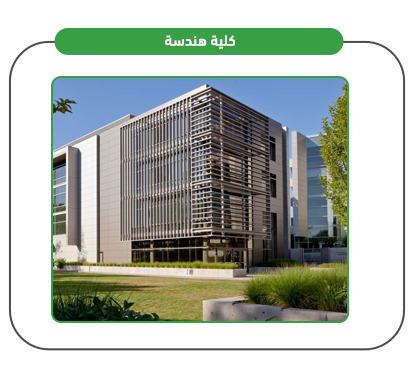The Faculty of Engineering project is an investment initiative aimed at establishing a specialized academic institution that offers comprehensive educational programs across various engineering disciplines. The project is based on the development of modern facilities, including advanced laboratories and lecture halls equipped with the latest technologies, creating a high-quality learning environment that meets students’ needs. Moreover, the curricula will be developed in alignment with international standards, with a strong focus on enhancing the technical and practical skills required in the labor market. The project also seeks to establish solid partnerships with local and international engineering companies and institutions to provide practical training opportunities that enrich students’ experiences and enhance their ability to apply theoretical knowledge in real-world settings. Additionally, the college will offer research programs and specialized workshops designed to foster innovation and entrepreneurship among students. The project also aims to attract distinguished professors and experts across all engineering fields to ensure high-quality education and research supervision. Accordingly, the Faculty of Engineering project aspires to prepare a new generation of innovative engineers who are capable of meeting future challenges and contributing to the development of society.

The Faculty of Engineering project represents an ambitious vision to establish a comprehensive educational institution that prepares qualified engineers to meet future challenges. The college adopts the latest educational technologies—such as virtual reality and self-directed learning—to provide an advanced and flexible learning experience. It places strong emphasis on practical training through strategic partnerships with the industrial sector, offering students hands-on experience in real work environments and equipping them with skills demanded by the job market.<br>In addition, the college develops specialized programs in modern engineering fields, such as Artificial Intelligence and the Internet of Things, alongside offering advanced graduate programs for those seeking deeper expertise in various engineering disciplines. To foster innovation, the college aims to establish business incubators that support students in transforming their creative ideas into successful entrepreneurial ventures.<br>With this integrated approach, the Faculty of Engineering project represents a transformative step in university education, blending theoretical knowledge with practical application, and empowering graduates to actively engage in the modern labor market.



Offering a wide range of engineering majors aligned with global market demands.
Buildings and laboratories equipped with the latest technologies.
Partnerships with industrial institutions to provide hands-on training opportunities.
Curricula that keep pace with the latest scientific and technological advancements.
Encouraging scientific research and innovation in various engineering fields.
Enhancing students’ critical thinking and problem-solving skills.
Providing services that support students’ integration into the labor market after graduation.
Participation in regional and international scientific competitions and exhibitions to foster innovation.
Executive summary
Study project services/products
Market Size Analysis
Risk Assessment
Technical study
Financial study
Organizational and administrative study

The Education Sector in the GCC Countries
Believing in the significance of the education sector and its role in national workforce localization, Mashroo3k Economic Consultancy and Market Research is pleased to present the key educational indicators in the Gulf Cooperation Council (GCC) countries—inviting investment in this vital sector:
The total number of early childhood education students (including nurseries and kindergartens) in the GCC countries reached approximately 851.5 thousand students, according to the latest available statistics.
The number of students in school education stages is estimated at 9.3 million, with 79.4% enrolled in public schools and 20.6% in private schools.
Adult education centers recorded around 181,247 learners.
The total number of higher education students is 2,206,446.
The number of early childhood education teachers is 50,647.
The number of school education teachers is approximately 727,904.
There are 5,806 operational institutions in early childhood education.
There are 32,310 operational institutions in school education.
Over recent years, GCC governments have worked to bridge the gap between education and labor market needs. They have adopted curricula aimed at increasing the share of vocational and technical education and promoted learning through digital platforms and modern technologies. Additionally, these six countries have significantly increased their spending on education to produce graduates who meet the private sector’s workforce demands.
According to the latest statistics:
Saudi Arabia allocates 18.9% of its national budget to education.
UAE spends 14.8%,
Oman allocates 12.2%,
Bahrain spends 9.8%,
Kuwait allocates 12.3%,
Qatar spends 10.5% on education.
By 2023, the private education market in GCC countries is expected to reach a value of USD 26.2 billion.
The Global Education Sector
The global education services market was valued at approximately USD 2,882.52 billion by the end of 2021. Experts projected this figure to reach USD 3,191.79 billion by the end of 2022, marking a compound annual growth rate (CAGR) of 10.7%.
Looking ahead to 2026, the market is expected to grow further to USD 4,623.90 billion, achieving a CAGR of 9.7% over the forecast period.

By the year 2030, the global value of the education industry is projected to reach USD 10 trillion.
By 2024, the value of online education worldwide is expected to hit USD 247.46 billion.
The AI-powered education market is set to grow at a compound annual growth rate (CAGR) of 36% from 2022 to 2030.
In terms of global student numbers:
In the year 2000, there were approximately 657 million students worldwide.
By 2019, this number had increased to 739 million.
For secondary education, the number of students grew from 452 million in 2000 to 601 million in 2019.